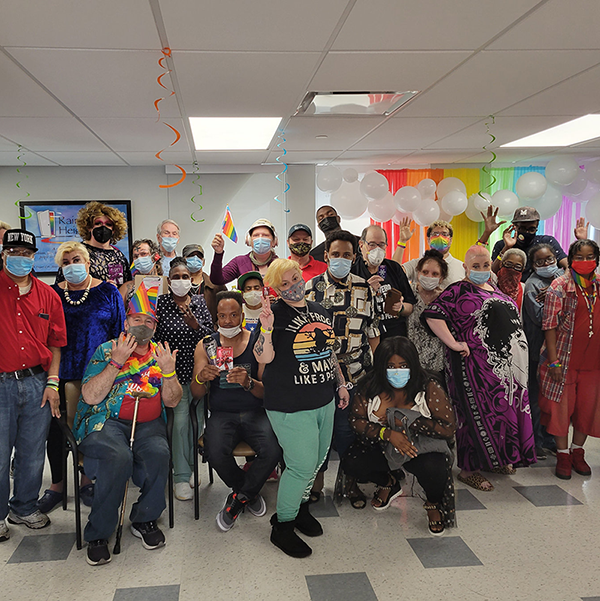Interview with Christian Huygen, Ph.D., Executive Director, Rainbow Heights Club
Belonging to a safe and supportive community is a building block for mental wellbeing — that’s especially true for LGBTQ+ people who are living with mental illness. We spoke with Dr. Huygen to learn more about Rainbow Heights Club, a National Council member organization in Brooklyn, New York, and the important work they’re doing to provide safe spaces for LGBTQ+ individuals.
Tell me a little bit about Rainbow Heights Club. What services do you provide?
Rainbow Heights Club is a drop-in space that offers peer-based, strengths-based psychosocial support and advocacy for lesbian, gay, bisexual and transgender New Yorkers who are living with mental illness. We provide a safe space for community members to socialize, access peer support and take the next step on their recovery journey together. We are open from Monday through Friday and provide in-person services from 1-5 p.m., including support groups, one-on-one assistance with Certified Peer Specialists, open socialization and dinner.
How are you creating a safe space for LGBTQ+ New Yorkers?
From its inception, Rainbow Heights Club has been inspired by traditional psycho-social clubhouse models that emphasize member choice and participation in program development. For 22 years, we have empowered members to share their input and, most importantly, act on it. All staff and members respect the right of each individual to express their sexual and gender identity as it feels right to them. This is a key aspect of our member-written code of conduct and is essential to our functioning.
How are you addressing the stigmas surrounding sexuality and mental health?
LGBTQ+ people living with mental illness often face a dual stigma, which stems from societal discrimination toward LGBTQ+ identities and a bias against mental illness. They may also be rejected by LGBTQ+ peers who are not living with mental illness. We want everyone who visits to understand that this is a space where they can be their whole selves.
To help treatment providers across New York State address these stigmas — and with support from the New York State Office of Mental Health and New York City Department of Health and Mental Hygiene — we offer trainings that teach how to affirm, support and work with mental health care consumers who identify as LGBTQ+ and highlight mental health concerns that disproportionately impact the LGBTQ+ communities due to stigma and marginalization.
What message do you try to instill in Rainbow Heights Club members?
The field of psychology has historically assumed that same-sex attraction or an expansive expression of one’s gender are pathological, and they have to be explained, corrected or cured. The point of our trainings, and the core message we’re trying to send to the people who come to us for support, is maybe you’re just human. Your desires, thoughts and feelings about who you are, who you want to be with and how you want to be with them are just aspects of the normal range of human variation.
All of us, LGBTQ+ or not, are prone to making self-destructive choices or engaging in behaviors that are harmful to ourselves and others. We all need help figuring out how to make healthy choices, but the only way we can do that is in a supportive community that allows us to have honest, open and fearless conversations about what we want, what we hope for and what we struggle with.
What are some exciting things you’re currently working on?
We’ll be taking some time in July to revise our E/Quality Care training offerings to highlight the impact of minority stress on LGBTQ+ individuals. Minority stress is a conceptual framework that explains how stigma, prejudice and discrimination create a hostile and stressful social environment that can lead to mental health symptoms. LGBTQ+ people may experience a number of stressors, like the internalization of societal discrimination, experience of violence or discrimination due to LGBTQ+ identity, exposure to violence and stigma faced by others in the community and hypervigilance due to experience or the observance of violence and discrimination. We believe behavioral health care providers should have the language they need to be able to acknowledge these realities when speaking with their clients, to provide truly affirming and transformative care.
What success story comes to mind when you think about Rainbow Heights Club’s impact?
One member found Rainbow Heights Club after his release from jail. Joining our community gave him the space to explore his sexuality and come to accept it. He started volunteering in the kitchen and working with our Community Oriented Recovery and Empowerment (CORE) services. He is now 17 years in recovery, has a full-time job and is in a loving, long-term partnership.
What do you enjoy most about the work you do?
Since 2001, the Rainbow Heights Club has been a place where LGBTQ+ individuals can feel human and have their strength, courage, playfulness and resilience acknowledged and affirmed. I hear time and again that this is the first place where members find the opportunity to feel joy in being themselves, to be courageous in their self-expression and appreciate all they have survived. That never gets old.
The National Council’s membership consists of health care organizations and management entities across the U.S. that offer supports to millions of adults, children and families living with mental health and substance use challenges. Learn how to become a National Council member today!




